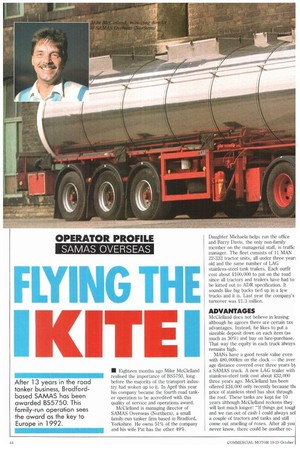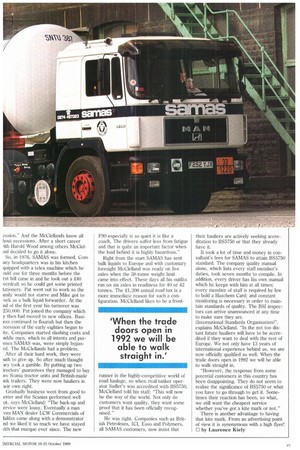F LY NO THE
Page 48

Page 49

If you've noticed an error in this article please click here to report it so we can fix it.
• Eighteen months ago Mike McClelland realised the importance of BS5750, long before the majority of the transport industry had woken up to it. In April this year his company became the fourth road tanker operation to be accredited with this quality of service and operations award.
McClelland is managing director of SAMAS Overseas (Northern), a small family-run tanker firm based in Bradford, Yorkshire. He owns 51% of the company and his wife Pat has the other 49%. Daughter Michaela helps run the office and Barry Davis, the only non-family member on the managerial staff, is traffic manager. The fleet consists of 11 MAN 22-332 tractor units, all under three year old and the same number of LAG stainless-steel tank trailers. Each outfit cost about 2100,000 to put on the road since all tractors and trailers have had to be kitted out to ADR specification. It sounds like big bucks tied up in a few trucks and it is. Last year the company's turnover was £1.3 million.
McClelland does not believe in leasing although he agrees there are certain tax advantages. Instead, he likes to put a sizeable deposit down on each item (as much as 30%) and buy on hire-purchase. That way the equity in each truck always remains high.
MANs have a good resale value even with 480,0001cm on the clock — the aver age distance covered over three years by a SAMAS truck. A new LAG trailer with stainless-steel tank cost about £32,000 three years ago. McClelland has been offered 234,000 only recently because thi price of stainless steel has shot through the roof. These tanks are kept for 10 years although McClelland reckons they will last much longer: "If things got tougt and we ran out of cash I could always sel a couple of tractors and tanks and still come out smelling of roses. After all you never know, there could be another re ession." And the McClellands know all bout recessions. After a short career rith Harold Wood among others McClelaid decided to go it alone.
So, in 1976, SAMAS was formed. Corn. any headquarters was in his kitchen quipped with a telex machine which he ould use for three months before the rst bill came in and he took out a £40 verdraft so he could get some printed tationery. Pat went out to work so the imily would not starve and Mike got to fork as a bulk liquid forwarder. At the nd of the first year his turnover was 250,000. Pat joined the company which y then had moved to new offices. Busiess continued to flourish but then the ecession of the early eighties began to ite. Companies started slashing costs and iiddle men, which to all intents and puroses SAMAS was, were simply bypased. The McClellands had a problem. After all their hard work, they were mth to give up. So after much thought -ley took a gamble. By putting up two irectors guarantees they managed to buy hik.) Scania tractor units and British-made ink trailers. They were now hauliers in ieir own right.
Gradually business went from good to etter and the Scanias performed well ut, says McClelland: "The back-up and ervice were lousy. Eventually a man rom MAN dealer LCW Commercials of Ialifax came along with a demonstrator nd we liked it so much we have stayed vith. that marque ever since. The new
F90 especially is so quiet it is like a coach. The drivers suffer less from fatigue and that is quite an important factor when the load behind it is highly hazardous."
Right from the start SAMAS has sent bulk liquids to Europe and with customary foresight McClelland was ready on five axles when the 38-tonne weight limit came into effect. These days all his outfits run on six axles in readiness for 40 or 42 tonnes. The £1,200 annual road tax is a more immediate reason for such a configuration. McClelland likes to be a front runner in the highly-competitive world of road haulage, so when rival tanker operator Sadler's was accredited with BS5750, McClelland told his staff: "This will now be the way of the world. Not only do customers want quality, they want some proof that it has been officially recognised."
He was right. Companies such as British Petroleum, ICI, Esso and Polymers, all SAMAS customers, now insist that their hauliers are actively seeking accreditation to BS5750 or that they already have it.
It took a lot of time and money in consultant's fees for SAMAS to attain BS5750 standard. The company quality manual alone, which lists every staff member's duties, took seven months to compile. In addition, every driver has his own manual which he keeps with him at all times; every member of staff is required by law to hold a Hazchem Card; and constant monitoring is necessary in order to maintain standards of quality. The BSI inspectors can arrive unannounced at any time to make sure they are.
(International Standards Organisation)", explains McClelland. "In the not too distant future hauliers will have to be accredited if they want to deal with the rest of Europe. We not only have 13 years of international experience behind us, we are now officially qualified as well. When the trade doors open in 1992 we will be able to walk straight in.
"However, the response from some potential customers in this country has been disappointing. They do not seem to realise the significance of BS5750 or what you have to go through to get it. Sometimes their reaction has been, so what, we still want the cheapest service whether you've got a kite mark or not."
There is another advantage to having that kite mark. From an advertising point of view it is synonymous with a high flyer! 0 by Laurence Kiely






























































































































































